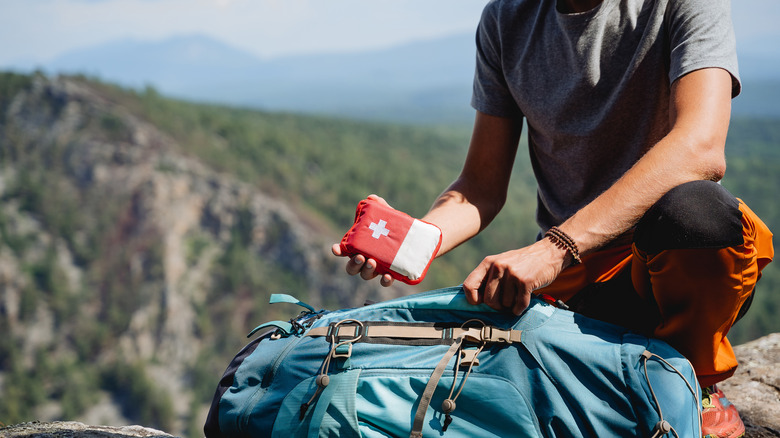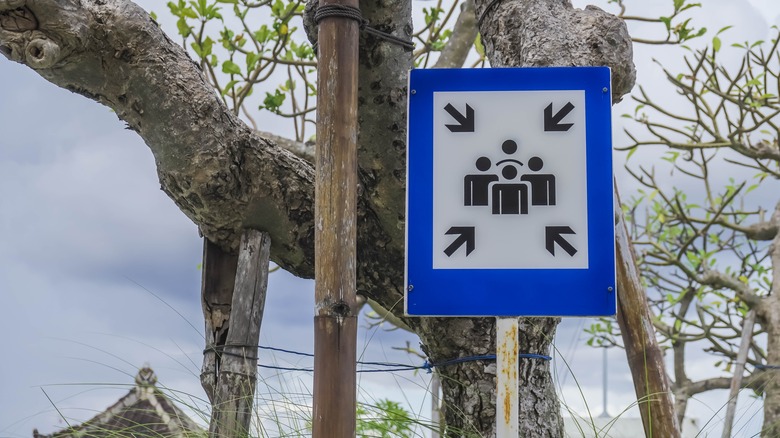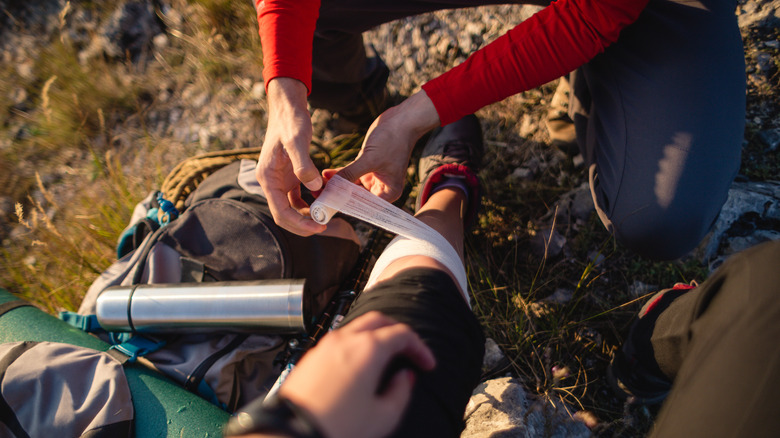Our Tips For Preparing And Staying Safe During An Earthquake
Despite incredible advancements in technology, earthquakes continue to strike without warning, leaving little time to react. Whether you live in an area prone to seismic activity, or are traveling to one, being prepared and knowing what to do can make all the difference — especially if you're adventuring in the great outdoors.
First and foremost, earthquake preparedness is essential to reducing damage, injuries, and loss of life. There are three elements to consider: an emergency plan, an emergency kit, and securing your space. Your emergency plan should include a communication line and a meeting point. Portable radios and offline apps are good strategies to keep you safe while in the outdoors. If you're traveling to a campground, some earthquake-prone destinations may have a protocol you should learn to ensure your safety.
In case an earthquake inflicts significant damage to infrastructure, it is important to prepare an emergency kit. This kit should sustain you for at least 72 hours. It should contain all of your hiking essentials that come in handy in case of an emergency, plus at least one gallon of water (per person) per day, non-perishable food, and blankets and sturdy shoes in case of sharp debris.
Also make sure to earthquake-proof your space. In an RV, this means you should anchor heavy bookshelves, cabinets, and appliances to walls. Use straps to secure electronics, and store heavy or breakable items on lower shelves. Additionally, know where the shutoff valves for gas and water are in case you need to turn them off to prevent fires or floods.
What to do during an earthquake
If you find yourself in the middle of an earthquake while on an outdoor adventure, remember these three actions: drop, cover, and hold on. Drop to your hands and knees to prevent falling. If you're in a tent or other temporary shelter, you can stay inside if it is secured on flat, open land. It's best to avoid running if you can, since moving during shaking increases the risk of injury from falling or from debris.
If you're on a hike, try to find an open area to avoid being hit by falling objects. If you're in the water, get out and do the same. Try to stay at low altitudes, or as low as you can safely go. If it is not safe to stay in place, and you know a meeting point for your campground or park, make your way there slowly and cautiously.
If you're driving, stop your vehicle, but be sure to stay away from overpasses, bridges, trees, and power lines. Do not stay in your car, as it offers a very little degree of protection from debris. If you're RV camping, the situation depends on the state of your RV. Larger RVs may provide the same protection as a sturdy wall in a house, but you should decide the best plan of action with your campmates beforehand so everyone is on the same page.
For travelers, the same rules apply. Be cautious of unfamiliar surroundings and assess the stability of your location. Hotel staff or locals may provide valuable guidance during an earthquake.
Stay alert after an earthquake
Once the earthquake has stopped, the aftermath presents new dangers. Be mindful of aftershocks, which can strike, minutes, hours, or even days after the main tremor. They can be just as dangerous, so remain alert before moving around. If you're solo hiking and have gotten hurt, stay calm, perform first aid, and seek help when it is safe. The dangerous nature of aftershocks means that the first thing you should do (once it is presumably safe to move around), is inspect your surroundings for damage. In an RV, check for cracks in the walls, broken windows, or signs of structural weakening. If you smell gas or see sparks, leave immediately, and report the issue to authorities. If possible, turn off the gas and water valves to prevent fires or flooding. If your tent or current accommodation is no longer safe for you, bring your emergency kit, relocate to a safer location, and inform your emergency contacts.
After ensuring your own safety, check on your tentmates, nearby campers, and neighbors, particularly those who may need assistance, such as the elderly, people with disabilities, or families with small children. Avoid putting yourself at risk, and offer help where you can.
Lastly, reassess and adjust your emergency plan as needed. If certain aspects didn't go as smoothly as expected, revise them to better handle future situations. It's crucial to stay informed during this time, so use a battery-powered radio or mobile alerts to keep up with emergency updates and instructions from local authorities.


